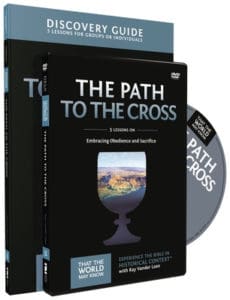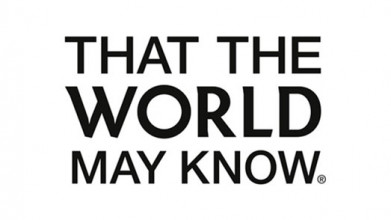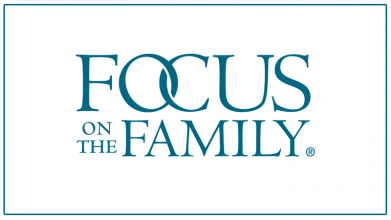Recap:
Ray Vander Laan: I realized that God’s people were born in the desert. Abraham was a desert man. Moses was a desert man. David spent time in the desert. Jesus spent time in the desert. And I realized, it was far more foundational to what God was doing to reclaim a broken world than what I had realized. I felt we needed to start with the Israelites in Egypt.
End of Recap
John Fuller: This is “Focus on the Family” and that’s gifted historian and Bible teacher, Ray Vander Laan and we have more from him today on “Focus on the Family” with your host, Focus president and author, Jim Daly. I’m John Fuller and we’re coming back to a really popular conversation that we had with Ray. He’s the host of the DVD series That the World May Know.
Jim Daly: John, for the past 20 years, Ray has taken folks to Israel and that surrounding area in the Middle East, helping people, particularly Christians, better understand and experience the Bible in its original and historical context. It’s one thing to, you know, hear the story, but when you really see the place and look over the valley and Ray begins to explain what Jesus was talking about or another biblical figure, it really brings it to life. And he does it with such insight and he is a scholar and he knows what he’s talkin’ about. And I think it’s one of the best ways for the person who understands the Word, but needs a little deeper meaning. It is a wonderful way to better understand the context of Scripture.
On the last broadcast, we learned so much from what he shared about his trip to Egypt, which is certainly an important Bible story. He shared his perspective on that region and helped us to get a … a more complete understanding of what it’s all about and how God has used Egypt throughout history to help shape his people. And again, I’ll just put the challenge out to you, if you want to know more about the words that you are reading and get them off the page and alive in your heart. That the World May Know is the series that will help you do it.
John: And you can learn more about the 13-part series, including a free sample, at www.focusonthefamily.com/radio. Let’s go ahead now and get back into the discussion, recorded some time ago with Ray Vander Laan.
Jim: And Ray, let’s just jump into it. For the folks out there that did not hear the previous program, I’d encourage them to go to the website or contact Focus on the Family to get a copy of the CD, because it was packed full of wonderful stories—
Ray: Thank you.
Jim: –and illuminations about the Old Testament and New Testament and how Jesus and how the Father, they were talking to us in those metaphors. And that’s been so enlightening to me, Ray and that’s why I’ve enjoyed it the last many mornings, working out, as I mentioned before, just being able to absorb that as my quiet time in the morning—5 o’clock when I’m up and before the kids are awake and listening to that.
In fact, my boys will come down and say, “You’re watching that Bible stuff again.” (Laughter) So, I’m saying, “Yeah, sit down.” And they have sat with me. I’ve got two boys, 7 and 9 and they’ll listen. And their little hearts can actually grab so much of this. Isn’t that true?
Ray: It really is. It’s amazing to me how much our God loves a story. He just has put together the most incredible—true, of course—story in the history of the universe. It is the history of the universe and to realize that God not only wants His people to know the story–to take it in in a sense–but He wants us to join the story. And kids love stories. Adults love stories. And if we can enter the story of God and feel as if, hey, this was part of my story, too, because I’m a sentence or a paragraph in God’s story. It’s an amazing thing.
Jim: And you know, Ray, I think one of the things that strikes me as I’ve watched that, is the gift that God’s given you. You are an outstanding teacher and good teachers tell good stories, isn’t that true?
Ray: Well, thank you. My mother was an outstanding teacher and she was a storyteller.
Jim: That’s right.
Ray: I guess God blessed me with that.
Jim: That’s what—
John: Hm.
Jim: –keeps kids and adults—
Ray: Yes.
Jim: –captivated.
Ray: Absolutely.
Jim: Let’s go back now. We were talking last time about Egypt and what the Israelites were facing and again, if you missed it, go back and take a listen to it. But let’s talk today about how God actually brought them out. You had some very insightful wisdom and insights in that part of Set 8, That the World May Know.
Ray: It was intriguing to me when I began to engage in understanding the Egyptian worldview, that they saw life as a situation where chaos had to be pushed back to bring what they called “harmony” or order. And they, of course, defined it as something that was brought about by their gods, to whom they attributed even Creation itself. In other words, they had a false view of the Creation of the universe, as done by their gods.
So, when God came to Egypt, it struck me that He was not only going to do whatever it took to get His people out safely, but God was going to directly come into conflict with the worldview of the Egyptians. So, the first thing that happens is, God brings 10 plagues.
And if you notice, 10 times in Genesis, God spoke and things came into being on the seven days of Creation. So, now it’s as if God comes and said, “Look, you’re giving the wrong creator credit.” So, the Creator of the universe is going to come and tell you that originally, “I brought it into existence with 10 words. Now I’m going to show you, I can take it out of existence with 10 words.”
So, it’s as if creation slowly, but surely is undone by the One Who had brought it into existence in the first place. And if you look at it, there’s an amazing sense that those 10 plagues directly confronted one of the gods of Egypt. So, the Nile River is the bloodstream of Osiris. And when the Nile turned to blood, it’s as if the Egyptians said, “Our god has failed. The God of the Hebrews is stronger.”
And one plague after another addresses a different god. The sun is dark for three days and Amun Ra, the great sun god is shown to be powerless before the God of the Hebrews. And so, God slowly, but surely says to the Egyptians and He says to His people, “These are not gods; I’m God.”
John: Hm.
Ray: “And I’m gonna show you that.” Now what also struck me is, that for the first nine plagues, Israel was a spectator. All she had to do was watch. In fact, the Hebrews are not recorded as saying one word. They just watch and they see their great god in action.
In the tenth plague, God says, “Now I want you to be part of this.” And He drew a line in the sand. In Egypt, sacrificing animals was rare, because in several of the central Egyptian religions, their gods had a sacred animal. They didn’t worship the animal apparently, but for example, the chief god, Amun Ra, had as his sacred animal, the ram—a sheep. And that animal was considered to be the marker, the holy marker of Amun Ra.
And hence, sacrifice for an Egyptian was considered an abomination. If you remember when Joseph came down to Egypt and then his brothers came, he said to them, “Let’s ask for Goshen. It’s isolated, because shepherds are an abomination to the Egyptians.” Egyptians didn’t like shepherds, ’cause they take the wool off these sacred animals. They eat the meat. They maybe even sacrifice them.
When God told Moses “Tell Pharaoh, we want to go out into the desert to sacrifice,” Moses said, “They’ll kill us; they’ll stone us,” because you don’t want to harm that animal. So, God said to the Hebrews—
John: Hm.
Ray: –“Take one of those animals and tie it to your house for four days.” And I can hear the Hebrews. “What about the Egyptian patrols? What if somebody reports us?” And Moses said, “Yes and what’s more, on the fourth day, I want you to kill the animal and put the blood on your doorposts.”
And at that moment, God asked for an act of faith from His people. And it struck me that, while all of what happened there in Egypt was due to the miraculous power of God, it was a simple act of faith on the part of His Hebrew people that unleashed that power on their behalf.
And I thought to myself, how often in my life have I hesitated to take that full step of faith with God. And maybe therefore, God was saying, “You know, I really want to act, but I need a step of faith. I need you to step out in faith and commit yourself fully to me. And the moment the Hebrews did that and put that blood on the doorpost, they were gone.
Jim: Ray, you talk about that as historical fact. That’s the Passover—
John: Uh-hm.
Jim: –which we still celebrate today.
Ray: Uh-hm.
Jim: I mean, that is still an act of faith, that His people—
Ray: Amen.
Jim: –should participate in it today. Talk about that for a moment. With all of the knowledge that you’ve gained, looking at ancient civilization—the archeology, all the excavations that you’ve been a part of in Israel and the Middle East—bring it forward for a moment. Last week, I was in New York and you’re looking at this city that’s full of light.
Ray: Uh-hm.
Jim: And if you’re in a late meeting at midnight, you come out, there’s still tons of people—
Ray: Uh-hm.
Jim: –and the technology that’s there and what people are pursuing—
Ray: Uh-hm.
Jim: –their dreams, the Big Apple—
Ray: Uh-hm, uh-hm.
Jim: –what they’re gonna find there and that’s repeated in different cities around the world—big cities. It’s still the same human heart.
Ray: Yes. It’s still Egypt. In other words, our world is still saying to us, “This is what chaos is and this is what meaningful life is.” But our world has it wrong, because our world thinks, if we accumulate enough, we’ll be happy. If we have enough fame, if we have enough power, if we have enough pleasure, then life will be meaningful and satisfying. And it presents a myth of what is meaningful and what isn’t.
And the idea of a self-sacrificing, willingness to give myself to care about others, to enter other people’s lives as Jesus offers to enter the lives of those who believe in Him, that somehow it’s hard for our world to buy that, that’s what makes life really worthwhile.
John: Hm.
Ray: And so, it’s as if God says, “Okay,” to His people today, “I want to show you what really is meaningful and what really is chaos. And then, I want you to live it and become My witness to the nations.” You know, one of the passages that struck me was, in Egypt, God said to Moses in Exodus, “I will make you like God to Pharaoh.” And I thought about that for a long time and I read a lot of people writing about it. And it struck me that God didn’t want someone to bring the message. He wanted somebody to be the message. He wanted Pharaoh to look at Moses and say, “Now that’s what God is like.”
And then He brought His people to Sinai and said, “You will be a kingdom of priests.” Well, one of the roles of a priest in the ancient world is to put God on display. So, you want to know what the God is like? Watch the priest. So, if God’s people were to be priests, that meant God said, “I want the whole world to look at you to know what I’m like.”
Well, Peter picks up on that in 1 Peter and he says, “You are a royal priesthood.” In other words, when you and I go to New York, God says, “Okay, you’re in New York, Jim. You’re in New York, John or Ray. You’re in New York. Show them what God is like. Show them His righteousness. Show them His tenderness, His love, His compassion.” We are those who put God on display. So, really, the theme of the Exodus is exactly in my mind, the theme that God gives to His people today.
John: Our guest is Ray Vander Laan and what you’re hearing on today’s “Focus on the Family” is just a small sampling of the kind of illuminating teaching you’ll find on the series, That the World May Know, which is a multiple part DVD series that so many—I mean, thousands and thousands—have benefited from.
I’m John Fuller, along with Jim Daly, president of Focus on the Family and Jim, I’m so glad we have this series and it’s really fun to be sitting here, the two of us listening to Ray teach this stuff. I’ve known these stories, but there are so many wonderful nuances. And Ray, I appreciate so much how you get up and get the big picture and you connect the dots in ways that so few seem to do these days as they teach the Scripture.
Ray: Well, thank you; praise God. I think that’s the Jewish approach and God trained me in that.
Jim: You know, Ray, let’s talk about that for a minute and John, because I think it’s a good example. People today, they go to Sunday school, you might go to Wednesday night service at your church and you hear a story and you hear the pastor give the message and basically, you know the general themes, you know, the Old Testament themes, what God was trying to do through the Ten Commandments, which on the previous program you talked about that being a marriage covenant. And just that alone is illuminating to us, to think, okay, there’s something more going on there than the “do’s” and the “don’t’s.”
John: Uh-hm.
Jim: I talk to many people and one of the things that I have found very beneficial is to provide them a set, for example, the Easter set that you did. It gives them such depth about the faith in just a 30-minute snippet and it gives them the ability to really better understand.
I’m thinking of a gentleman right now that is a friend of mine. He’s an agnostic. He and I have had many conversations about faith. He’s looking for answers. I’m doing my best, as the president of Focus on the Family, to provide those answers. Yet, I have found it extremely beneficial to give him the That the World May Know series, at least in bits and pieces and say, “Go away; listen to this and come back and let’s talk more about it.” And that’s one way you can use this material, Ray. And I just want to say, “Thank you for your faithfulness to put that down on a DVD, so that people, in addition to what they’re getting from their churches on Sunday, they can really augment their understanding of the Scripture. And that is what’s so wonderful, John, about the That the World May Know series.
Program Note:
John: We’re talking with Ray Vander Laan on today’s “Focus on the Family” and let me invite you to order the DVD set, No. 12 in the series. It’s called Walking with God in the Desert and it will cover the content we’re talking about today and you’ll have the benefit of seeing Ray and all the different historical sites in Egypt that he’s talking about. Find details about That the World May Know at www.focusonthefamily.com/radio or call 800, the letter A and the word FAMILY.
And when you come alongside and support the work here at Focus to proclaim truth as we’re doing through That the World May Know and this broadcast, we’ll say thanks for your generous donation today by sending that DVD, No. 12 to you.
Let’s go ahead and return now to the conversation with Ray Vander Laan on today’s “Focus on the Family.”
End of Program Note
John: Ray, I understand that as you were recording some of this new series, that there were some fairly significant moments on the set, which is of course, in the ancient Bible lands. Anything come to mind that our—
Ray: Well, there—
John: –listeners would find [interesting] ?
Ray: –were several amazing, amazing moments. Early on to my surprise, I was not familiar with Egypt enough, having never filmed there, filming in Egypt is extremely expensive. Temples are $5,000 per filming hour. And so, generous … the Prince Foundation generously funded this, but there was a lot of money at stake.
And then, I discovered shortly before we went, that all filming in Egypt is done in the presence of censors. They listen to every word that’s filmed. And unless they approve what you’ve said, they don’t release the tapes. So, after a couple days of filming, it turned out that our censors weren’t satisfied, as one of them said to me, “Too much Moses, too much Israel.”
And I kinda looked at him and said, “This is a piece about the Exodus of the Israelites from Egypt, led by Moses. I don’t know quite how I would [do it otherwise]. ” But they were hesitant, whether or not that was the kind of thing they wanted us to do. And they did not approve the tapes. And so now we had to make a decision: do we continue to spend some days, $5,000 an hour, not knowing when we’re finished, whether we’re gonna walk out of here with that material or not?
And so, we had people back in the States praying. Our group went into some pretty intense prayer and together we made a decision and said, “We really believe God is in this thing. Let’s continue.” And so, we did.
John: Hm.
Ray: And honestly, we filmed 10 days and—
Jim: Not knowing.
Ray: –did not know until the day we crossed into Israel, whether they would release the tapes or not. And some of us went through that customs place. We sat on the other side praying. The two guys with the tapes in their luggage were brought into a little room that was all checked. And suddenly, they came walking out.
Jim and John: Hm.
Ray: And they said people looked at it. They read the papers. Somebody stamped it and God decided this was gonna go. And there was no doubt that God was behind that. There was another moment, too.
John: I’m gonna stop you there, Ray, because I’m thinking of the illustration you just gave us about God wanting His people to be involved in the Exodus.
Ray: Yeah.
John: Here’s a parallel there for what you were experiencing.
Ray: And honestly, we felt that. I’m a little bit hesitant to say that, because I don’t want anybody to think I felt, you know, I was playing the role of Israel on the Exodus or Moses—
John: No, but—
Ray: –or something.
John: –there’s a walk of faith there.
Ray: There was no question that I think if we had stopped and said, “Okay, God, we’ll wait until You release the tapes and then we’ll continue, I really believe that God would not have given us those permissions.
John: Hm.
Ray: I think the fact, we said, “Lord, we’re gonna commit this to You,” God said, “Okay, if you trust Me, I’ll take care of you.” And I really believe that in my heart that, that was God’s gift to us.
Jim: Isn’t that just like our faith though?
Ray: Amen!
Jim: He does that over and over again. (Laughter)
Ray: And so, your point, that really nothing has changed since 3,000 year[s]. Okay, the buildings look different. The technology’s different, but worldviews are still in confrontation.
Jim: Yeah.
Ray: We’re still asked to trust God of a worldview that sometimes to our world, looks crazy, but it’s the same. You know, there was another moment, too that showed me that this was a much bigger story than just our story.
I have the personal view or the Jewish view is, that behind the pagan gods are demonic powers. The Book of Deuteronomy says—
John: Uh-hm.
Ray: –“Sacrifices offered to idols are offered to demons.” Paul alludes to that in 1 Corinthians. And whether we say the stones were idols or not, I wouldn’t go there, but simply the idea that behind paganism is a very powerful Evil One.
So, when we decided to film the 10 plagues, I struggled a bit with, where do we film? I can’t go to 10 different temples at $5,000 an hour. My son-in-law, who’s my research assistant said, “There’s a temple that has all 10 gods in the holy of holies. It’s just a little temple that was the temple of the workers who were digging the tombs of the Pharaohs in the Valley of the Kings. And so, we went there—beautiful little temple—
Jim: Hm.
Ray: –not very large at all. And there, sure enough, in this eerie holy of holies are carved all the figures of the major Egyptians gods.
Jim: Hm.
Ray: So, we decided to film there. Well, we got all ready, we set it up. We walked through it. Action! I walked into that holy of holies with about 10 people that were in the film group. I started to introduce the idea of “God went into confrontation with these evil powers behind the Egyptians gods” and my battery pack quit—my microphone.
Jim: Hm.
Ray: Cut! Came out, changed it, batteries look good. He said, “Let’s try another one.” So, we tried another one. Same thing happened. That happened three times and all three battery packs didn’t work. And my wife said to me, “I don’t think this is about battery packs. I don’t think this is about microphones.”
In the Bible, God says to Moses, “I will execute judgment on the gods of Egypt.” And my wife said to me, “There’s a struggle goin’ on here—
John: Hm.
Ray: –that’s much bigger than just Egyptian censors. This is about evil power.” So, a group of them went out and began to pray.
John: How did you feel when she said that?
Ray: The hair was standing up on the back of my neck.
John: I mean—
Ray: And—
John: –I’m feelin’ a little bit of that—
Ray: –I honestly—
John: –just to hear you–
Ray: –I was–
John: –explain that.
Ray: –in that holy of holies, even before she said that, I had the eerie feeling that there was something there. And part of it is the mystique of, you’re in the holy of holies of a pagan temple, so it feels eerie anyway.
John: Hm.
Ray: But they put the hardwire microphone on me and I went back in and God just spoke to my heart. I didn’t hear a voice, but instead of talking about those 10 pagan gods, I talked to them. And I went in there and as if I were Moses, I said, “Okay, Osiris, are you gonna stand before the God of the universe?”
John: Hm.
Ray: “Are you powerful enough to stand? Then tomorrow the Nile will be blood.” And I went through the 10 gods like that and it was a moment when I felt a spiritual warfare like I have never felt in my life. If you watch that video clip and you look at the look on the faces of the people in that room, their eyes are like saucers—
John: Ah.
Ray: –because honestly, there was a struggle there that day. And so, what it affirmed to me again, is that God is saying, “Look; there’s evil in our world.
Jim: Uh-hm.
Ray: [It] takes a lot of forms. I’m at war with that evil. Join Me.”
John: Hm.
Ray: “Do your small part.”
John: Hm.
Ray: “Just make a video or be Focus on the Family or be a high school Bible teacher or be a Christian mom or dad. Do your part and you join Me in the confrontation with the forces of evil itself.” And it helped me to understand that defeating the power of evil isn’t just about the big stuff—the really evil stuff. But defeating the power of evil is about being faithful and trusting God in the little things.
Jim: Ray, let me take you back to one of the earlier sets, because this is one of the most profound illustrations of good and evil that plays out today. And that was, I believe, the sacrifice of children—
Ray: Uh-hm.
Jim: –in Carthage and other areas of ancient—
Ray: Uh-hm, uh-hm.
Jim: –Middle Eastern times. Talk about that similarity with how we treat the preborn child today and the issue of abortion.
Ray: It really is even a bigger framework than that, because if you would read the Book of Exodus sometime, noticing how often it speaks about those who are weak—the orphan, the widow, the fatherless—how often it speaks of the stranger, the foreigner who’s in your gates. It’s as if God said, “I put you in Egypt as slaves and strangers, as the underbelly really of society—as the dregs of society. And they crushed you with bitterness. Now, from now on, you will always be sensitive to people who are hurting.”
Jim: Hm.
Ray: “You will always understand why you have to care for the hungry and the homeless and the poor.” Well, that sanctity of life to God was so pervasive, that in a sense, their slavery became the background often in Exodus, it says, “You were strangers in Egypt, so care about people who are hurting.”
Well, if you take that as a principle, that God always stands for innocent life, for the people who are hurting, there is no greater example of that in my opinion than to take the life of a helpless unborn infant, who has absolutely no recourse, no resistance whatsoever.
In the culture Israel walked into, I didn’t find that in Egypt at all, that they offered human sacrifice. But in the culture Israel walked into, it was a common thing to believe that the offering of a young infant child—usually males—to their gods was a way to gain the favor of the gods. So, if you want economic well-being, if you want military superiority over your enemies, you have to sacrifice the life of the innocent.
Jim: Hm.
Ray: And that in the book of Jeremiah, in my opinion, becomes the final straw that God said, “I can’t deal with you as My people. I’m gonna send you into captivity. I’m gonna bring My wrath upon you, because I will not tolerate the shedding of innocent blood.” And it’s as if, if you don’t care about the hurting in society, eventually, you get cold enough to life that you can even exterminate the helpless.
John: Well, we still have that ongoing struggle for good and evil today and we’ve been listening to Bible teacher and historian, Ray Vander Laan about insights from the Scriptures and applications for our lives today. And like so many have, I trust that you’ve benefited from hearing Ray these past couple of days on the program. So many thousands of individuals have grown spiritually from Ray’s teaching as captured in the series, That the World May Know.
In fact, a woman named Linda who works at a church in Michigan told us, “I really enjoyed using the materials That the World May Know with Ray Vander Laan and seeing the historical aspects of Israel and what it’s means to other people that are touring with them. It made the Bible come to life for me as I read it.” And that’s exactly the intent of that series.
Jim: John, what I love about that, it changed her life. I mean, it made an impact on her and how she sees her faith and her role in this world while she’s on this earth. And I think that’s the most wonderful aspect of it. It equips you to better understand who you are in Christ and what He expects of you.
And to tell you the truth, that’s a goal here at Focus, to help you in your marriage, to help you with parenting, but to also help you in your walk with the Lord. And I firmly believe That the World May Know is the best tool we have to equip you in your walk with God.
John: Well, take advantage of Ray’s insights and the beautiful videography in set 12, Walking with God in the Desert by calling 800-A-FAMILY to order your copy today, 800-232-6459 or you’ll find details at www.focusonthefamily.com/radio .
And perhaps you’ve not given to Focus on the Family lately or contributed to our work here ever. When you make a generous financial contribution today to the work of Focus, we’ll send that DVD set number 12 to you as our gift. Request that as you make your donation when you call 800-A-FAMILY.
Our program was provided by Focus on the Family and on behalf of Jim Daly, I’m John Fuller, thanking you for listening and hoping you have a great weekend. Come back on Monday and you’ll hear Pastor Mark Gungor talking about having the right attitude in marriage. That’s next time, as we help you and your family thrive.

















